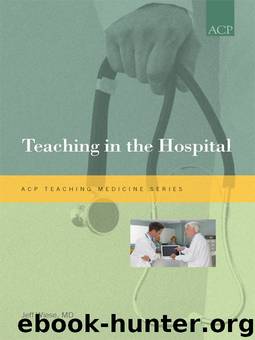Teaching in the Hospital (Teaching Medicine Series) by Jeff Wiese

Author:Jeff Wiese [Jeff Wiese]
Language: eng
Format: epub
Publisher: ACP Press
Published: 2010-03-31T16:00:00+00:00
Remediation
It is important to appreciate that feedback enables learners to improve only when they are able and willing to do so. Sometimes deficits require remediation, as when a learner proves incapable of achieving an important milestone, or when personal problems, including, unfortunately, substance abuse, preclude satisfactory performance.
Remediation usually warrants intervention by someone of authority, typically the program director or clerkship director ( 9 ). The prevalence of residents requiring remediation is 7% to 15% ( 8 ). It is important to identify and remediate the struggling trainees because their behaviors and actions affect patient safety and timely care, increase the amount of time faculty spend providing correction, add responsibilities and work for their colleagues, and affect the morale of the entire training program ( 10 ). As discussed earlier, a problem learner can also “infect” other learners by way of their bad example, with junior learners modeling bad behavior. It has also been shown that trainees who demonstrate unprofessional behavior during their training are more likely to perpetuate that behavior into their careers ( 11 ). But most important, identifying and remediating problem trainees is our professional obligation. A full discussion of remediation is beyond the scope of this book, but there are a few essential points that an attending physician should know.
Identify and Report
The first and most important point is that trainees requiring remediation should be identified and reported to the respective clerkship director or program director. The attending should not be shy about doing this because trainees who have true career-limiting deficits in performance are likely to have had similar events on other rotations. Given the overlapping schedules between attendings, residents, and students and the “silo” mentality of most medical schools (for example, internal medicine does not review student performances with pediatrics), it is possible, in fact likely, that these trainees have had long-standing problems, including depression and other affective problems, that have not been identified because they were not reported. The program or clerkship director is in a much better position to detect trends in performance. The trainee’s personal life during that rotation may have dramatically changed the performance; in that case, this report will probably be a one-time event. Even so, the director will be better able to provide counseling or assistance to the trainee if she knows about the trainee’s fall-off in performance as soon as possible.
Suspect Substance Abuse
Accusations of substance abuse should not be made lightly, but clues that might suggest this disorder should be reported immediately so that the resident can receive assistance. Unfortunately, it is rarely as easy as smelling alcohol on a resident’s breath or observing pinpoint or dilated pupils. The signs are much more subtle, and are usually identified in the context of trends. A sudden change in a resident’s performance or appearance, for example, may suggest impairment. Isolated events of unprovoked outbursts or overreacting to a situation can occur, but if these behaviors become regular occurrences, impairment should be suspected. Routinely showing up late to work or routinely leaving the wards at inappropriate times should also prompt suspicion.
Download
This site does not store any files on its server. We only index and link to content provided by other sites. Please contact the content providers to delete copyright contents if any and email us, we'll remove relevant links or contents immediately.
| Dictionaries & Terminology | Drug Guides |
| Education & Training | Instruments & Supplies |
| Medical Atlases |
Periodization Training for Sports by Tudor Bompa(8271)
Why We Sleep: Unlocking the Power of Sleep and Dreams by Matthew Walker(6721)
Paper Towns by Green John(5188)
The Immortal Life of Henrietta Lacks by Rebecca Skloot(4587)
The Sports Rules Book by Human Kinetics(4385)
Dynamic Alignment Through Imagery by Eric Franklin(4214)
ACSM's Complete Guide to Fitness & Health by ACSM(4060)
Kaplan MCAT Organic Chemistry Review: Created for MCAT 2015 (Kaplan Test Prep) by Kaplan(4012)
Livewired by David Eagleman(3772)
Introduction to Kinesiology by Shirl J. Hoffman(3769)
The Death of the Heart by Elizabeth Bowen(3619)
The River of Consciousness by Oliver Sacks(3603)
Alchemy and Alchemists by C. J. S. Thompson(3520)
Bad Pharma by Ben Goldacre(3427)
Descartes' Error by Antonio Damasio(3277)
The Emperor of All Maladies: A Biography of Cancer by Siddhartha Mukherjee(3162)
The Gene: An Intimate History by Siddhartha Mukherjee(3098)
The Fate of Rome: Climate, Disease, and the End of an Empire (The Princeton History of the Ancient World) by Kyle Harper(3067)
Kaplan MCAT Behavioral Sciences Review: Created for MCAT 2015 (Kaplan Test Prep) by Kaplan(2986)
